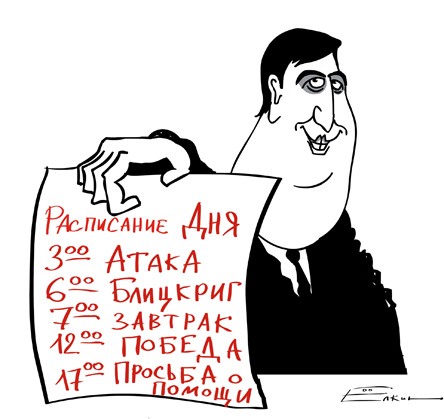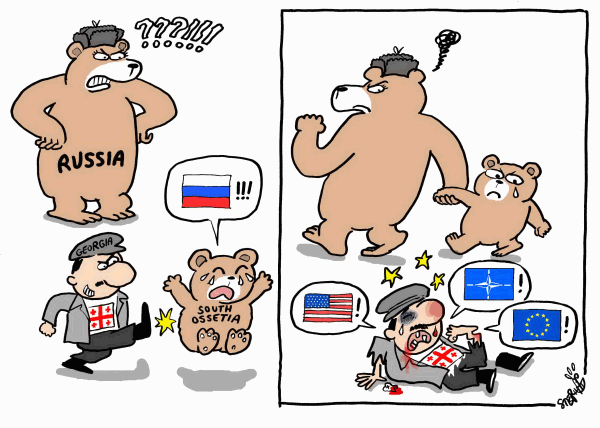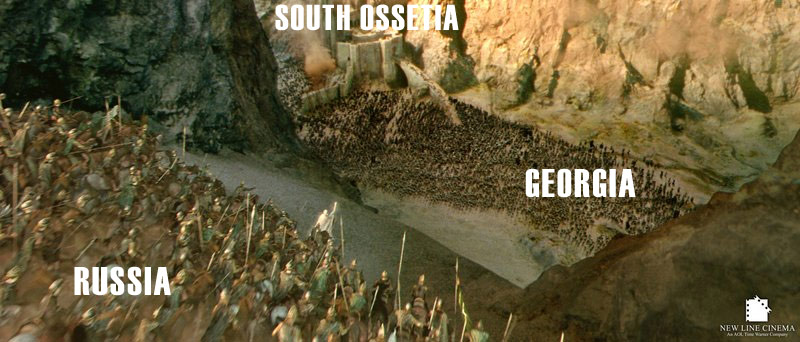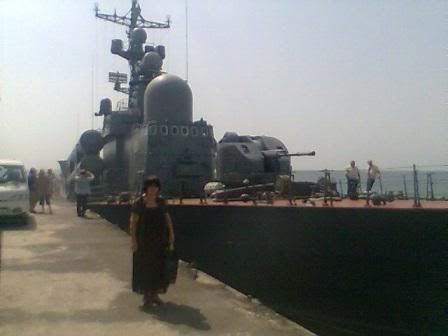It's hard for me to believe that you are really familiar with the history of South Ossetia's relationship with both Russia and Georgia, for you to say that the analogy would be their 'fear of Russia rolling through their cities.' While I have not personally studied the situation in depth, there is every evidence that the Ossetians fear the Georgians (or hate) far more then the Russians...
Russian lawmaker hints at long stay in Georgia
CNN
updated 5 minutes ago
Russia says it will begin pulling back its troops from Georgia on Monday, but a Russian lawmaker has compared the situation to the U.S. presence in Iraq.
Russia President Dmitry Medvedev told French President Nicolas Sarkozy on Sunday that Russia would start pulling back its forces from Georgia on Monday, Medvedev's office said. [..]
Russian troops would begin withdrawing to a buffer zone and into the breakaway province of South Ossetia as stipulated by the cease-fire, Medvedev's office said.
Moscow gave no indication of when the withdrawal would be completed.
Early Monday a Georgian Interior Ministry official said there had been "no signs" of a Russian troop withdrawal.
Lawmaker Konstantin Kosachev, head of the Russian parliament's foreign affairs committee, said Moscow would withdraw only when it was "assured that Georgians would not continue to use military force" in the breakaway regions of South Ossetia and Abkhazia.
Russian troops will leave "sooner or later," Kosachev said, saying the timetable depends "definitely on how Georgians will continue to behave."
"If I would ask you in response to the same question how fast the American forces can leave Iraq, for example, the answer would be as soon as we have guarantees for peace and security there," Kosachev said. "The same answer would be toward this situation."
The United States has been in Iraq since its 2003 invasion.
German Chancellor Angela Merkel, visiting Georgia, called on Russia to stick to its agreement to pull its forces out of Georgia within "the next few days." [..]
"President Medvedev agreed, but we cannot postpone and we cannot delay with these tasks," Merkel said in the Georgian capital, Tbilisi. [..]
"It is up to Russia now to decide whether it will continue to defy the world ... or accomplish its final goal of regime change in Georgia," Saakashvili said Sunday.
U.S. Defense Secretary Robert Gates said he was skeptical that Russia would quickly withdraw its forces.
"My own view is that the Russians will probably stall and perhaps take more time than anybody would like," Gates said in an interview broadcast Sunday. "I think we just need to keep the pressure and ensure that they abide by the agreement that they've signed, and do so in a timely way." [..]
The U.N. High Commissioner for Refugees said Sunday that it estimated the fighting has displaced more than 158,000 people, citing statistics from the Russian and Georgian governments.
Almost 99,000 of those displaced were in Georgia, while 30,000 were displaced in South Ossetia and 30,000 have fled to Russia, the UNHCR said.
When I say Poland 'borders' Russia, I don't mean they literally border each other - merely that it falls within what is, yes, Russia's zone of influence.
It's fine with me if you want to pretend that such things do not exist; they plainly do exist. The US has worked within it's sphere of influence, Russia has, Rome did, every major power has done the exact same thing throughout history; to pretend that these things no longer exist is foolish.
Cyclo wrote:Russia [is] dealing with countries in their sphere of influence in the same way as the US has done in the past.
And how is that OK? I mean, did you shrug at America's invasions, engineering of coups, funding of paramilitary groups etc in Latin America as merely rational and understandable - what, it being in America's "sphere of influence" and all?
If you disagreed (or disagree in hindsight) with America's actions in Latin-America, then how is it suddenly just understandable and OK if Russia does it in the "zone of influence" it is claiming?
UPDATE 1-Georgia says Russian forces destroying munitions
TBILISI, Aug 18 (Reuters) - The Georgian Interior Ministry accused Russian forces on Monday of blowing up stores of Georgian ammunition and weaponry at a base near the western town of Senaki, ahead of a planned withdrawal from Georgia.
Spokesman Shota Utiashvili said Moscow's troops had also destroyed the runway at the base, which lies about 240 km (150 miles) west of the capital Tbilisi.
"They are destroying everything and then pulling out of these places," he said. "If they call this a pullout, then I do not understand the meaning of the word."
He said a column later left the base, heading northwards.
Russia announced on Monday it had started a military pull-back from areas of Georgia under a ceasefire brokered by France to end conflict over the Russian-backed breakaway region of South Ossetia.
A Reuters journalist in Senaki said he heard three loud explosions but was not allowed to enter the area. He said a Russian official had given advance warning that there would be controlled explosions.
Explosions were also heard in the Gori area of central Georgia, though there were no reports of fighting.
Russian forces have moved into many Georgian military bases, airfields and military warehouses in the course of the 10-day conflict, taking away and destroying equipment. There have also been attacks on many airfields. [..]
Georgia Says Russia Troops Advance, Disputes Planned Withdrawal
Aug. 18 (Bloomberg) -- Georgia said Russian troops are advancing, rejecting a statement from the Kremlin that they began withdrawing today.
``I can confirm right now is that as we speak, Russian forces are heading deeper into Georgian territory from the central city of Khashuri,'' Eka Zhguladze, Georgia's Deputy Interior Minister, said in a telephone interview.
Speaking after the Russian statement at about 2:15 p.m. Moscow time, she said that a Russian armored column was moving south to the city of Borjomi, and another was moving to the city of Sachkhere. Georgia is also suffering from unexplained forest fires, she added.
Russia has started withdrawing its troops from Georgia, a Defense Ministry official said, a day after President Dmitry Medvedev said the pullout would begin today.
Anatoly Nogovitsyn, deputy chief of Russia's General Staff, was scheduled to provide more details at a press conference scheduled at about 3 p.m. in Moscow, the official said by telephone. [..]
And I think that this is exactly the response that you saw during the US' meddling in Latin America - other countries opposed it, they said things about it (more later then at the time, as everything was not well known at first) - but at the end of the day, what was really done by anyone about it? Nothing. And I predict that is exactly what will happen in this case.
Russia's grip on Georgia appears tight even as Moscow says withdrawal begins
Even as Russia pledged to begin withdrawing its forces from neighboring Georgia on Monday, American officials said the Russian military had been moving launchers for short-range ballistic missiles into South Ossetia, a step that appeared intended to tighten its hold on the breakaway territory.
The Russian military deployed several SS-21 missile launchers and supply vehicles to South Ossetia on Friday, according to American officials familiar with intelligence reports. From the new launching positions north of Tskhinvali, the South Ossetian capital, the missiles can reach much of Georgia, including Tbilisi, the capital. [..]
The SS-21 is a short-range ballistic missile carried on a mobile launcher. It can be used to attack command posts and airfield and troop concentrations. Russian forces used the missile in the Chechnya conflict, where it was believed to have caused significant civilian casualties.
The Kremlin announced Sunday that Russia's president, Dmitri Medvedev, had promised to begin the troop withdrawal in a conversation with President Nicolas Sarkozy of France, who negotiated a six-point cease-fire agreement. Medvedev did not specify the pace or scope of the withdrawal, saying only that troops would withdraw to South Ossetia and a so-called security zone on its periphery.
In Moscow on Monday, a Russian military spokesman announced that Russian forces had in fact begun to pull out. But on the ground in Georgia, significant troop movement was not yet evident.
At the entrance to the central city of Gori on Monday afternoon, Russian soldiers sat on armed personnel carriers, smoking or napping in the heat of the afternoon.
Soldiers held the main bridge and the military base, and were running checkpoints on the roads. Convoys were shuttling to Tskhinvali. [..] "They are not moving," said Temuri Yakobashvili, Georgia's Reintegration Minister. [..]
"We're getting contradictory messages," said Alexander Lomaya, secretary for Georgia's National Security Council. "The generals aren't saying what they're going to do. The soldiers say they're waiting for orders."
On Sunday, the United States and European leaders reacted with wariness, and Russia's recent military moves appeared to add an element of frustration.
"Well, I just know that the Russian president said several days ago Russian military operations would stop. They didn't," Secretary of State Condoleezza Rice said on NBC's "Meet the Press." "This time I hope he means it. You know the word of the Russian president needs to be upheld by his forces." [..]
Despite the Kremlin's pledge of a pullout from Georgia, long lines of Russian military vehicles snaked south on Sunday along the main road from Tskhinvali to Gori in South Ossetia. Large transport trucks carrying power generators, troops, bags of potatoes, chairs and tables wound their way through the villages. A reporter driving south on the road passed lines of vehicles for nearly 40 minutes.
[In]stead of thinning out their forces in South Ossetia, the Russians appear to have been consolidating their presence there by deploying SS-21 missile launchers and, American officials say, by installing surface-to-air missiles near their military headquarters in Tskhinvali. [..]
Western officials have also been monitoring Russian troop movements, which may be intended to strengthen Russian forces in and around Georgia. A battalion from Russia's 76th Guards Airborne Division has been deployed from Pskov to Beslan, a city in North Ossetia. Several additional battalions from the 98th Guards Airborne Division at Kostroma also appeared to have been preparing over the weekend for possible deployment to the Caucasus region.
Beyond South Ossetia, the Russian military has taken other steps to raise its profile. In recent days, several Bear-H bombers have carried out training missions over the Black Sea, according to American officials familiar with intelligence reports. The Russian bombers are capable of carrying nonnuclear cruise missiles, and government intelligence analysts have told the Pentagon that a recent Bear training flight appeared to simulate a cruise-missile attack against Georgia.
The Russian moves are seen at the Pentagon as a way for Russia to show that it considers its sphere of influence to include Georgia and other parts of the so-called near abroad zones " Belarus, Ukraine, the Caucasus and the Caspian [..]. In general, the actions are seen as a matter of muscle flexing, or "force projection," in Pentagon parlance, and are not viewed as signs that Russia intends to make a major military push to take Tbilisi.
Russian officials may also be calculating that their nation's military presence may make some NATO members more skeptical toward accepting Georgia into the alliance. While the United States has strongly supported Georgia's membership, some allied officials fear they may be dragged into a war in the Caucasus if Georgia is admitted.
While the Russians have accused Georgian forces of killing many civilians in South Ossetia, it has not been possible for outsiders to corroborate those claims. Nor has it been possible to corroborate Georgian assertions that South Ossetians were purging Georgian villages in "ethnic cleansing" reprisals, although refugees have described a campaign of violence and looting, and tours along the main road show villages with as many as 90 percent of the buildings burned.
The president of South Ossetia, Eduard Kokoity, may have implicated himself in the forced expulsion of Georgians by asserting that they would not be allowed back. Russia's Foreign Ministry quickly sought on Sunday to minimize the significance of his remark, calling it "an emotional statement made under the influence of the situation resulting from the massive armed attack organized by the Georgian leadership against South Ossetia."
Whereas now you suddenly seem to reason that, if we're not able to send our troops in, there's nothing we can do?
And it takes a strange view of global politics, to put it mildly, to accuse America - a power that's presently conducting massive counter-insurgency operations in not one but two strife-torn Muslim-majority countries, while patrolling the world's sea lanes, maintaining garrisons from Western Europe to the Pacific Rim, engaging in delicate counterproliferation efforts in the Middle East and Northeast Asia, and running secret anti-terror missions in God knows how many countries - of lapsing into 1920s-style "isolationism" because it's unwilling to simultaneously police every border dispute in the Caucuses.






